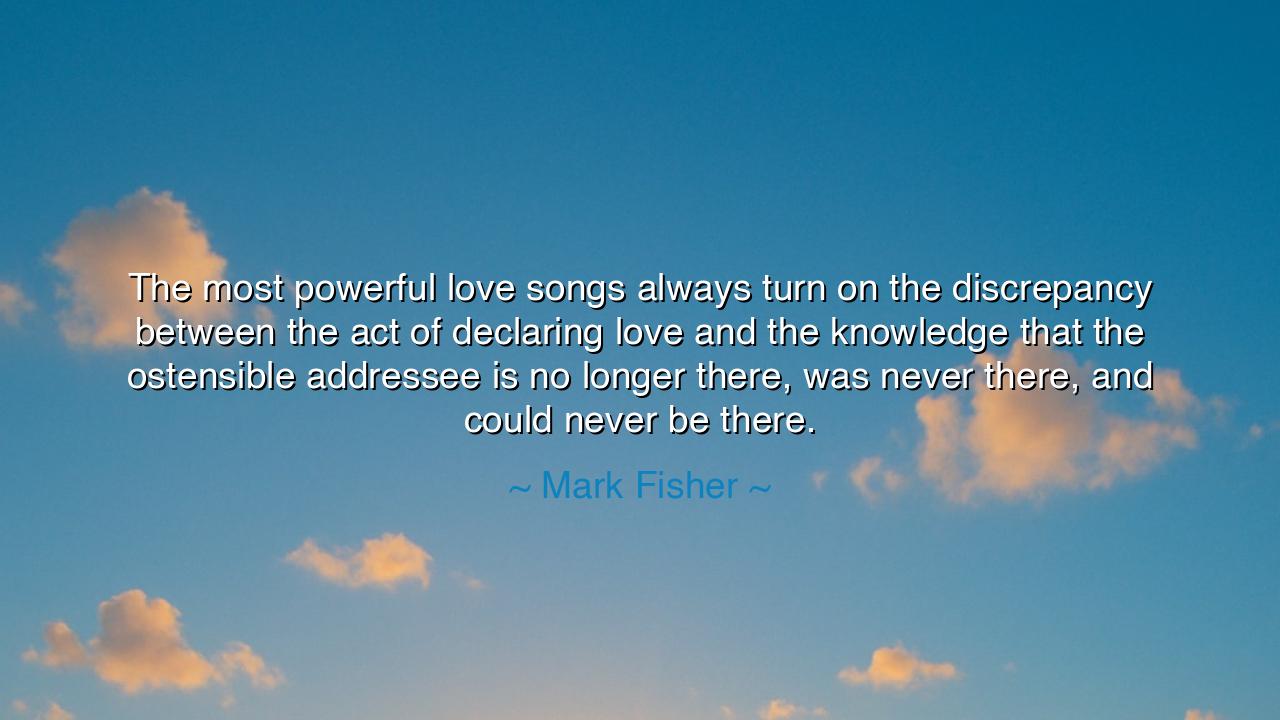
The most powerful love songs always turn on the discrepancy
The most powerful love songs always turn on the discrepancy between the act of declaring love and the knowledge that the ostensible addressee is no longer there, was never there, and could never be there.






"The most powerful love songs always turn on the discrepancy between the act of declaring love and the knowledge that the ostensible addressee is no longer there, was never there, and could never be there." Thus spoke Mark Fisher, the cultural philosopher who gazed into the wounds of modern life and revealed the deep sorrow hidden beneath its art. His words pierce like the notes of a haunting melody, teaching us that the truest love songs are not born of fulfillment, but of absence; not of possession, but of longing. For what shakes the human heart most is not the comfort of love attained, but the ache of love forever out of reach.
The meaning of this teaching is profound. When a singer lifts their voice to declare love, yet the beloved is absent—gone, imagined, or impossible—the song becomes a vessel of pure yearning. This discrepancy between desire and reality creates the tension that moves us so deeply. We feel the burning of what could have been, the grief of what never was, and the ache of what can never be. It is this gap—between declaration and impossibility—that makes such songs eternal, for they reflect the deepest human truth: that longing often outlasts fulfillment.
History gives us examples of this law of the heart. Consider the medieval troubadours who sang of courtly love. Their verses praised noble ladies who could never be theirs, bound by marriage, rank, or vow. Yet it was precisely this impossibility that gave the songs their power. The unattainable beloved became a mirror of spiritual yearning, a symbol of perfection that stirred souls not toward possession but toward longing. Their music survives not because their loves were fulfilled, but because their songs carried the eternal ache of the unreachable.
In modern times, too, we see this truth. When Billie Holiday sang "I’ll Be Seeing You," the sweetness of the words was pierced by the sorrow of absence, for the lover was not there and perhaps would never return. Audiences wept not at the thought of love enjoyed, but at the vision of love lost, suspended in memory. The song’s power lay in its ability to make absence more present than presence itself. Here Fisher’s insight is revealed: it is not the certainty of love that moves us, but the contradiction between its declaration and its impossibility.
This paradox echoes even in the myths of old. Orpheus, the greatest musician of Greece, descended into the underworld to reclaim Eurydice, his lost bride. His song was so powerful that even Hades relented, granting him her return. Yet with a single glance back, she was lost to him forever. The legend endures not because Orpheus succeeded, but because his song was born of absence, of a love forever beyond reach. In this myth lies the same principle Fisher described: the song of love is most powerful when it confronts the void.
The lesson for us is clear: the human heart is stirred most deeply not by completion but by yearning. It is in the tension between desire and impossibility that our souls are awakened. To live fully, we must accept that some of the most profound loves in our lives may never be fulfilled, and yet they shape us, inspire us, and give rise to art that transcends time. A song of fulfilled love may fade, but a song of unfulfilled longing endures, for it speaks to the universal wound of humanity.
Practical action follows. Do not fear the ache of longing, nor despise the pain of absence. Let it teach you, let it shape you, let it flow through your words, your art, your actions. If you are an artist, write of what cannot be, for it is there that the deepest truths lie. If you are a seeker, embrace the lessons of desire denied, for they sharpen your soul. And if you are a lover, do not be ashamed of impossible longings—they are part of the human story, the same story sung by troubadours, poets, and musicians across the centuries.
So I say to you, children of tomorrow: remember the wisdom of Mark Fisher. The greatest love songs are not declarations of triumph but laments of impossibility. Their power lies in absence, in the eternal space between desire and fulfillment. Cherish the longing that lives within you, for it is both wound and gift, sorrow and song. From it rises the music that speaks across ages, the voice of the heart that says: even in absence, love endures.






AAdministratorAdministrator
Welcome, honored guests. Please leave a comment, we will respond soon